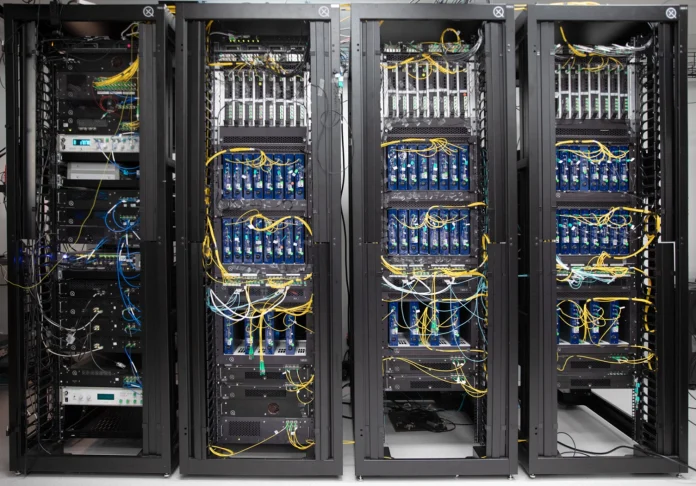In a historic achievement for the quantum computing industry, Xanadu has unveiled the world’s first universal photonic quantum computer.
Named Aurora, this 12-qubit machine represents a revolutionary leap in quantum technology, combining scalability, modularity, and networking capabilities.
Consisting of four independent server racks interconnected by cutting-edge photonic technology, Aurora is built from 35 photonic chips and incorporates a staggering 13 kilometres of fibre optics.
Remarkably, this state-of-the-art system operates entirely at room temperature, a significant departure from the cryogenic requirements of many other quantum computers.
Aurora has the potential to scale up to thousands of server racks and millions of qubits, paving the way for quantum data centres capable of addressing the most complex computational challenges.
What sets Aurora apart: The advantages of photonic quantum computing
Aurora leverages photonics, the manipulation of light particles (photons), as the foundation for quantum computation and networking.
This approach offers distinct advantages over traditional quantum computing methods, including reduced cooling requirements, faster processing speeds, and seamless scalability.
By utilising commercially available photonic chips fabricated with mature manufacturing techniques, Aurora ensures that its architecture is both practical and forward-thinking.
Central to the success of the photonic quantum computer is its modular design. The four server racks operate independently but are seamlessly networked together, showcasing the scalability and flexibility of the system.
Each module is built with robust qubit states that support advanced quantum operations, including real-time error correction and decoding – essential elements for practical quantum computing.
Furthermore, Xanadu’s photonic technology enables straightforward networking, making it possible to interconnect an indefinite number of modules.
This architecture is not only scalable but also aligned with the stringent requirements of quantum clock rates and classical hardware controls, setting the stage for large-scale implementations.
Christian Weedbrook, the founder and CEO of Xanadu, commented: “Photonics really is the best and most natural way to both compute and network.
“We now could, in principle, scale up to thousands of server racks and millions of qubits, but first, we will focus on performance in reducing loss and being fault tolerant.”
Overcoming quantum challenges
While Aurora’s modular scalability solves one of quantum computing’s biggest challenges, another significant hurdle remains: improving performance through fault tolerance and error correction.
Achieving fault-tolerant quantum computing requires minimising optical loss, a key area of focus for Xanadu’s team.
By collaborating with foundry partners, Xanadu aims to optimise chip design and fabrication processes, thereby enhancing the efficiency and reliability of its photonic architecture.
The recently published results of Aurora include detailed measurements of optical loss tolerances, offering a roadmap for refining the system to meet the stringent demands of fault-tolerant quantum computing.
The transformative potential of quantum computers
Quantum computers hold immense promise for transforming how we approach complex problems.
Unlike classical computers, which use binary bits to process information, quantum computers utilise qubits that can exist in multiple states simultaneously. This enables them to perform calculations at speeds exponentially faster than traditional systems.
Applications of quantum computing span a wide range of industries. In healthcare, quantum computers could accelerate drug discovery by simulating molecular interactions at an unprecedented scale.
In logistics, they could optimise supply chains to reduce costs and environmental impact. Financial institutions could use quantum algorithms to enhance risk assessment and portfolio optimisation, while advancements in artificial intelligence could lead to breakthroughs in machine learning and natural language processing.
Aurora represents a crucial step toward realising these possibilities. By addressing the twin challenges of scalability and fault tolerance, Xanadu has laid the groundwork for a future where quantum computing becomes a practical and transformative tool.
The photonic quantum computer demonstrates not only the feasibility of scaling quantum systems but also the practicality of deploying them in real-world scenarios.
As the company works to refine its optical loss tolerances and enhance fault tolerance, the dream of utility-scale quantum computing inches closer to reality.









